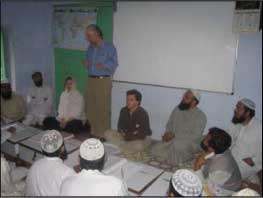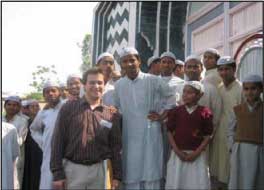Sharing a Universal
Message with Very Different Audiences
By Frankie Martin
Washington, DC
|

Dr.
Akbar Ahmed speaks to an English class, the first
of its kind in Deoband, with the author and Hailey
Woldt looking on
|
This
spring I was offered the opportunity by my favorite professor
at American University in Washington, DC, Dr. Akbar Ahmed,
to take a trip that changed my life. I traveled with Dr.
Ahmed and his research team on the Middle East and South
Asian sections of a trip conducted as a part of the Brookings
Institution, Pew Forum, and American University sponsored
project “Islam in the Age of Globalization.”
I was very aware after the attacks of 9/11 that it was more
important than ever for Westerners to understand the Islamic
world, and saw this project as an opportunity to change
negative perceptions of Islam in the West and foster greater
understanding between these two great world civilizations.
The project allowed me to travel to the Muslim world and
speak to people about issues they were concerned about,
including their interpretations of the Muslim faith, internal
economic and political issues, and perceptions of the West.
During the trip, I traveled to madrassas, mosques, and universities
and spoke to many people including students, professionals,
and politicians like Pakistan’s president Pervez Musharraf.
Throughout the journey, from the Middle East to Pakistan
and India and on to Southeast Asia, Professor Ahmed and
our team delivered a message of peace and understanding
and encouraged inter-religious and intercultural dialogue
as the only way forward for Muslims, Christians, and Jews
to avert a seeming collision course.
The response to this message, as I witnessed personally,
was universally very strong. Muslims of all ideological
persuasions spoke to us after our talks, telling us of their
joy that I and the other American student that accompanied
me, Hailey Woldt, had come to their countries and communities
to learn more about the Muslim world. In a time of such
high tension, it was a relief for us that we had been welcomed
so warmly in areas where we as Americans had been fearful
to travel. Following a speech by Professor Ahmed in Islamabad,
an old man, who said he had traveled a long way to reach
the event, presented me with some papers he had written
on interfaith dialogue and asked if there was anything he
could do to help reach out to Christians and Jews. I had
interactions like this constantly throughout the trip, many
people asked us for suggestions as to how they could help
bridge the gulf between Islam and the West; from engineering
students at Jordanian universities to the religious scholars
of Deoband, India.
The trip left me optimistic that relations between both
the Western and Islamic worlds and Muslims and Jews, which
at times seem so toxic, could be improved with human interaction
and conversation. Upon our return to Washington, Professor
Ahmed continued giving speeches, and when he invited me
to attend a dialogue with Karen Armstrong in New York hosted
by the US Council on Foreign Relations, an American think
tank that publishes the magazine Foreign Affairs, I jumped
at the chance. Ms. Armstrong, a prolific writer on religious
affairs, has written many of my favorite books, so I was
very excited to meet her. The speech was a sold out, standing
room only event in New York filled with many journalists
and American foreign policy makers in which both Professor
Ahmed and Ms. Armstrong spoke of the necessity for the Western
and Islamic worlds to better know and understand one another.
It was certainly a different audience from the madrassas
we addressed in India, for example, but the result was the
same. Recognizing the importance of the message, we were
again mobbed by people asking how they could help.
Last month Professor Ahmed became the first Muslim ever
to address the Holocaust Museum in Washington DC in a sold
out event attended by an overflow crowd of 500 that addressed
the growing problems of anti-Semitism and anti-Americanism
in the Islamic world. The event was attended by many prominent
Muslims, including the president of ISNA and several ambassadors
from Muslim countries. Dr. Ahmed’s friend Rabbi Bruce
Lustig, the head of the Washington Hebrew Congregation and
son of a Holocaust survivor, was unable to attend but sent
his regards in a letter read before the event began. Rabbi
Lustig wrote that Professor Ahmed’s voice is one of
“moderation and reason which reminds us that God’s
teaching calls upon us to eradicate all prejudice, hated
and bigotry. His unfaltering moral compass has led him to
many nations to speak on behalf of religious tolerance and
human dignity.” Rabbi Lustig, along with Bishop John
Chane of Washington’s National Cathedral, has joined
Professor Ahmed in many interfaith dialogue initiatives.
The event carried an important message of religious tolerance
I knew was sorely needed. Despite the warm welcome our team
received in the Muslim world, I was keenly aware of challenges
that anti-Semitism, and also anti-Americanism posed to the
kind of dialogue we, and most people we met, believed we
needed to have. In his speech, Professor Ahmed spoke about
the dangers posed by anti-Semitism and anti-Americanism
and the need to use compassion to ensure that nothing like
the Holocaust ever happened again. He also spoke out against
“Islamophobia”, the hatred of Muslims by Westerners,
which had reached dangerous levels after 9/11.

The
author with a group of students at a Deoband mosque
|
This
event, like the others, provoked a very positive response,
with Professor Ahmed receiving a standing ovation at its
conclusion. Inspired by the event, a Jewish woman about
to depart for Israel told Professor Ahmed she was nearly
moved to tears by the talk and asked if she could do anything
to facilitate meetings with Palestinians in an effort to
foster goodwill.
My experiences speaking in the Muslim world and here in
the United States to Christians, Muslims, and Jews, have
taught me much. In very different parts of the world, people
responded in the exact same fashion when given the same
message. People understand that there is far too much hatred
between people of different faiths and cultures and want
tensions to diminish. Almost everyone I spoke to on my trip
to the Muslim world sought to reach out to the West, but
hoped that in turn Westerners would reach out to them, a
sentiment echoed by Americans here in the US. They seem
to believe, as I do, that only with greater understanding
and knowledge of the “other side” will our problems
diminish. It is, after all, very difficult to understand
the position of someone you don’t know anything about.
I’ve repeatedly seen first hand what this kind of
dialogue can do. At a madrassa in New Delhi I spoke to 200
young students who told me they prayed for insurgent attacks
on American troops in Iraq, a statement which gave me pause.
Given the political context of our discussion, would we
be able to converse in a meaningful way? After a somewhat
icy start, however, the students and I began speaking freely.
I answered many of their questions about the role of Islam
in the United States, responding that there were mosques
in America and that Muslims could worship freely. By the
end of the meeting I was mobbed by the students and signed
quite a few autographs. I don’t know if any political
opinions were changed as a result of our dialogue, but at
least the students got a chance to see a different side
of the United States and learn from me, as I learned from
them.
Despite the prevalence of serious political problems in
the world, most people have rejected the path of death and
destruction as the way forward. In this environment I am
hopeful that more people can adopt the spirit of compassion
and engage in greater dialogue with the “other side,”
whoever they may be. Only through sincere conversation,
human interaction, and an open mind can we begin to strip
away much of the hatred that so often threatens to overtake
us. I feel privileged to have had the opportunity to accompany
my professor to help bring this universal message to people
in both the Islamic and Western worlds.
-------------------------------------------------------------------------------------

